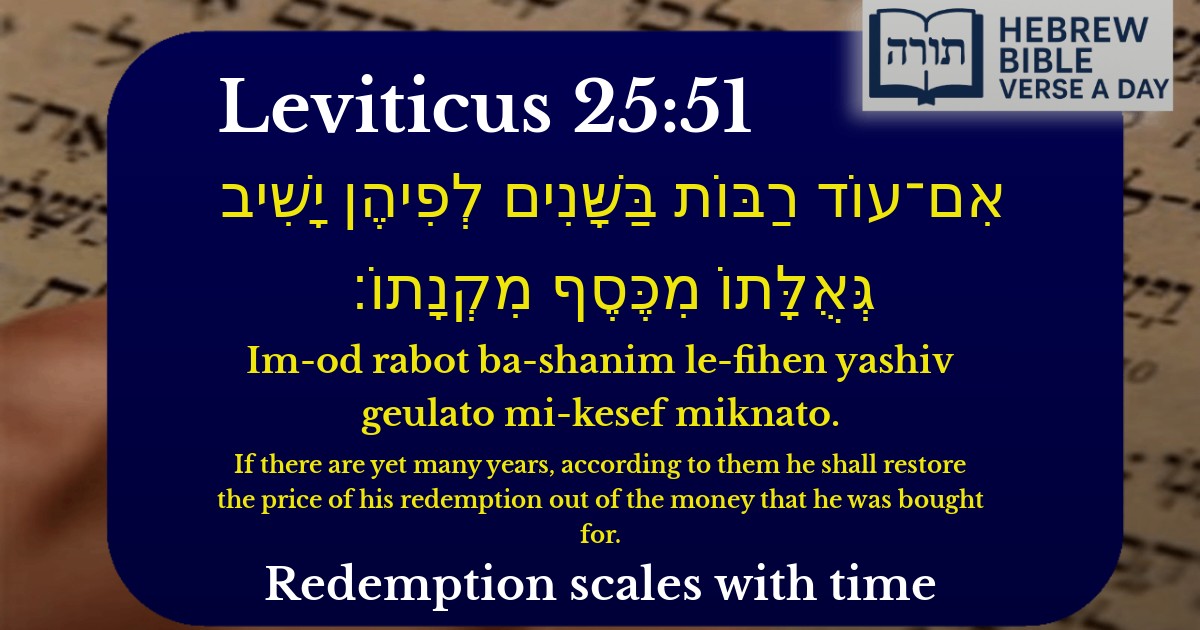Frequently Asked Questions
Q: What does Leviticus 25:51 mean in simple terms?
A: Leviticus 25:51 discusses the laws of a Jewish indentured servant who was sold due to poverty. If many years remain until the Jubilee year (Yovel), the servant must pay back a portion of their original purchase price to gain early freedom. The Torah provides a fair calculation based on the remaining years of service.
Q: Why is Leviticus 25:51 important in Jewish law?
A: This verse is part of the Torah's ethical and economic system, ensuring fairness for indentured servants. It teaches that even in difficult circumstances, people must be treated with dignity. The Rambam (Hilchot Avadim) elaborates on these laws, emphasizing compassion and justice in labor relations.
Q: How does Leviticus 25:51 apply today?
A: While the specific laws of Jewish indentured servants do not apply today, the principle of fair treatment for workers remains central in Jewish ethics. Employers must ensure just wages and working conditions, as derived from the Torah's emphasis on compassion (based on Talmud, Bava Metzia 83a).
Q: What is the 'Jubilee year' mentioned in Leviticus 25:51?
A: The Jubilee (Yovel) is a 50-year cycle in the Torah when all indentured servants go free and ancestral lands return to their original owners (Leviticus 25:10). Rashi explains that this system prevents permanent poverty and maintains social equality, reflecting G-d's ownership of the land.
Q: How was the redemption price calculated in Leviticus 25:51?
A: The redemption amount was proportional to the remaining years until the Jubilee. For example, if a servant was bought for 50 shekels with 10 years until Yovel, each year 'cost' 5 shekels. If freed after 3 years, they would pay back 35 shekels (50 minus 15). This is derived from Talmudic calculations (Arachin 29b).


Context of the Verse
This verse (Vayikra 25:51) is part of the Torah's laws regarding the redemption of an eved Ivri (Hebrew indentured servant) who was sold due to theft and could not repay. The passage outlines the calculations for how much the servant must pay to regain freedom if they choose to remain in servitude beyond the initial six-year term or until the Yovel (Jubilee) year.
Explanation of the Verse
The verse states: "If there are yet many years [remaining until Yovel], according to them he shall restore the price of his redemption out of the money that he was bought for." This means:
Halachic Principles
The Talmud (Kiddushin 15a) elaborates on this law, explaining that the redemption price is determined by:
Moral and Ethical Lessons
The Midrash (Toras Kohanim 25:8) derives from this verse the importance of fairness in financial dealings, even in servitude. The Torah ensures that:
Rambam's Clarification
Rambam (Hilchos Avadim 3:6) emphasizes that this law applies only to an eved Ivri who voluntarily extended service beyond six years. The Torah’s structured redemption system reflects its commitment to human dignity and economic justice.